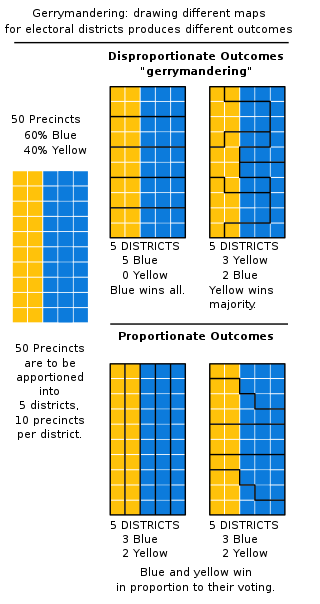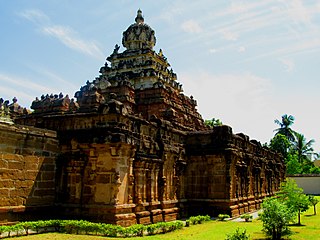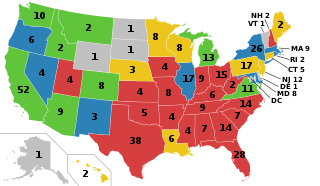Related Research Articles

An election is a formal group decision-making process by which a population chooses an individual or multiple individuals to hold public office.

In representative electoral systems, gerrymandering is the political manipulation of electoral district boundaries to advantage a party, group, or socioeconomic class within the constituency. The manipulation may involve "cracking" or "packing". Gerrymandering can also be used to protect incumbents. Wayne Dawkins, a professor at Morgan State University, describes it as politicians picking their voters instead of voters picking their politicians.
Politics of India works within the framework of the country's Constitution. India is a parliamentary secular democratic republic in which the president of India is the head of state & first citizen of India and the Prime Minister of India is the head of government. It is based on the federal structure of government, although the word is not used in the Constitution itself. India follows the dual polity system, i.e. federal in nature, that consists of the central authority at the centre and states at the periphery. The Constitution defines the organizational powers and limitations of both central and state governments; it is well recognised, fluid and considered supreme, i.e. the laws of the nation must conform to it. India is officially declared a secular and socialist state as per the Constitution.

In the United States, politics functions within a framework of a constitutional federal republic. The three distinct branches share powers: the U.S. Congress which forms the legislative branch, a bicameral legislative body comprising the House of Representatives and the Senate; the executive branch, which is headed by the president of the United States, who serves as the country's head of state and government; and the judicial branch, composed of the Supreme Court and lower federal courts, and which exercises judicial power.

Cuba has had a socialist political system since 1961 based on the "one state – one party" principle. Cuba is constitutionally defined as a single party Marxist–Leninist socialist republic with semi-presidential powers. The present Constitution of Cuba, which was passed in a 2019 referendum, also describes the role of the Communist Party of Cuba to be the "leading force of society and of the state" and as having the capability of setting national policy, and First Secretary of the Communist Party is the most powerful position in Cuba. The 2019 Constitution of Cuba identifies the ideals represented by Cuban independence hero José Martí and revolutionary leader Fidel Castro as the primary foundation of Cuba's political system, while also stressing the importance of the influence of the ideas of Marx, Engels, and Lenin.

The Bharatiya Janata Party is a political party in India and one of the two major Indian political parties alongside the Indian National Congress. Since 2014, it has been the ruling political party in India under the incumbent Prime Minister Narendra Modi. The BJP is aligned with right-wing politics and has close ideological and organisational links to the Rashtriya Swayamsevak Sangh (RSS), a far-right paramilitary organisation. Its policies adhere to Hindutva, a Hindu nationalist ideology. As of January 2024, it is the country's biggest political party in terms of representation in the Parliament of India as well as state legislatures.

On the federal level, Russia elects a president as head of state and a parliament, one of the two chambers of the Federal Assembly. The president is elected for, at most, two consecutive six-year terms by the people. The Federal Assembly has two chambers. The State Duma has 450 members, elected for five-year terms. The Federation Council is not directly elected; each of the 89 federal subjects of Russia sends 2 delegates to the Federal Council, for a total of 208 (178 + 30, members.

The state of Democracy in Middle East and North Africa can be comparatively assessed according to various definitions of democracy. De jure democracies in the Middle East and North Africa are according to system of government:

Kanchipuram also known as Kanjeevaram, is a stand alone city corporation, satellite nodal city of Chennai in the Indian state of Tamil Nadu in the Tondaimandalam region, 72 km (45 mi) from Chennai – the capital of Tamil Nadu. Known as the City of Thousand Temples, Kanchipuram is known for its temple architectures, 1000-pillared halls, huge temple towers and silk saris. Kanchipuram serves as one of the most important inland tourist destinations in India. Kanchipuram has become a centre of attraction for foreign tourists as well. The city covers an area of 36.14 km2 (13.95 sq mi) and an estimated population of more than 13,00,000 in 2021. It is the administrative headquarters of Kanchipuram District. Kanchipuram is well-connected by road and rail.

The Democracy Index published by the Economist Group is an index measuring the quality of democracy across the world. This quantitative and comparative assessment is centrally concerned with democratic rights and democratic institutions. The methodology for assessing democracy used in this democracy index is according to Economist Intelligence Unit which is part of the Economist Group, a UK-based private company, which publishes the weekly newspaper The Economist. The index is based on 60 indicators grouped into five categories, measuring pluralism, civil liberties, and political culture. In addition to a numeric score and a ranking, the index categorizes each country into one of four regime types: full democracies, flawed democracies, hybrid regimes, and authoritarian regimes. The first Democracy Index report was published in 2006. Reports were published every two years until 2010 and annually thereafter. The index includes 167 countries and territories, of which 166 are sovereign states and 164 are UN member states. Other democracy indices with similar assessments of the state of democracy include V-Dem Democracy indices or Bertelsmann Transformation Index.
A hybrid regime is a type of political system often created as a result of an incomplete democratic transition from an authoritarian regime to a democratic one. Hybrid regimes are categorized as having a combination of autocratic features with democratic ones and can simultaneously hold political repressions and regular elections. Hybrid regimes are commonly found in developing countries with abundant natural resources such as petro-states. Although these regimes experience civil unrest, they may be relatively stable and tenacious for decades at a time. There has been a rise in hybrid regimes since the end of the Cold War.

Gerrymandering is the practice of setting boundaries of electoral districts to favor specific political interests within legislative bodies, often resulting in districts with convoluted, winding boundaries rather than compact areas. The term "gerrymandering" was coined after a review of Massachusetts's redistricting maps of 1812 set by Governor Elbridge Gerry noted that one of the districts looked like a mythical salamander.

The Vaikunta Perumal Temple in Kanchi, a village in the South Indian state of Tamil Nadu, is dedicated to the Hindu god Vishnu. The temple is constructed in the Dravidian style of architecture. Vishnu is worshipped as Vaikunta Perumal and his consort Lakshmi as Anandavalli. The temple was originally built by Pallavan, with later additions from the Chola. The temple is known for the inscriptions indicating the democratic practises of electing representatives for the village bodies during the regime of Parantaka Chola .This Vishnu Temple is mentioned in narsingh Puran.

Democratic backsliding is a process of regime change toward autocracy in which the exercise of political power becomes more arbitrary and repressive. The process typically restricts the space for public contest and political participation in the process of government selection. Democratic decline involves the weakening of democratic institutions, such as the peaceful transition of power or free and fair elections, or the violation of individual rights that underpin democracies, especially freedom of expression. Democratic backsliding is the opposite of democratization.
The V-Dem Institute, founded by Staffan I. Lindberg in 2014, studies the qualities of government. The headquarters of the project is based at the department of political science, University of Gothenburg, Sweden.
Democracy in Iraq is a fledgling process, but Iraq achieved a more democratic approach than most surrounding countries. Iraq has a score of 3.51 of ten on the 2021 The Economist Democracy Index, which is considered authoritarian. Iraq scored 0.362 on the V-Dem Electoral Democracy Index in 2023, ranking 3rd in the Middle East and 115th worldwide. Numerous wars, corruption, and civil and ethnic conflict in Iraq have made it difficult for a stable democratic government to emerge.

Democratic backsliding, also known as autocratization, is the decline in democratic qualities of a political regime, the opposite of democratization.

Democratic backsliding in the United States has been identified as a trend at the state and national levels in various indices and analyses. Democratic backsliding is "a process of regime change towards autocracy that makes the exercise of political power more arbitrary and repressive and that restricts the space for public contestation and political participation in the process of government selection".
Electoral autocracy is a hybrid regime, in which democratic institutions are imitative and adhere to authoritarian methods. In these regimes, regular elections are held, but they are accused of failing to reach democratic standards of freedom and fairness.
References
- ↑ V-Dem Institute (2023). "The V-Dem Dataset" . Retrieved 3 February 2024.
- ↑ Dutta, Anisha (22 June 2023). "India secretly works to preserve reputation on global Democracy Index". The Guardian.
- ↑ Pillai, Shreeya and Lindberg, Staffan I. (2021) "Democracy Broken Down: India" in Democracy Report 2021: Autocratization Turns Viral pp.20–21. V-Dem Institute
- ↑ "India Is 'One of the Worst Autocratisers in the Last 10 Years,' Says 2023 V-Dem Report". The Wire. 7 March 2023.
- ↑ "Democratic Backsliding in India, the World's Largest Democracy". V-Dem Institute . 24 February 2020. Archived from the original on 27 February 2021. Retrieved 3 January 2021.
- ↑ Forbes India Investigation: India's most gerrymandered constituencies, Karthik Shashidhar, 2019
- ↑ India 'gerrymanders' Kashmir region in redrawn electoral map, 2022
- ↑ Robinson, 1997, p. 23
- ↑ Diodorus 2.39
- ↑ Larsen, 1973, pp. 45–46
- ↑ de Sainte, 2006, pp. 321–3
- ↑ R., Nagaswamy (2003). Uttaramerur. Chennai: Tamil Arts Academy. pp. 12–16.
- ↑ Padmaja, T. (7 March 2024). Temples of Kr̥ṣṇa in South India: History, Art, and Traditions in Tamilnāḍu. Abhinav Publications. p. 88. ISBN 9788170173984.
- ↑ Vaikunta perumal temple inscriptions, Uttiramerur, TN and democratic election practices 1000 years ago, Navrang India, September 02, 2022